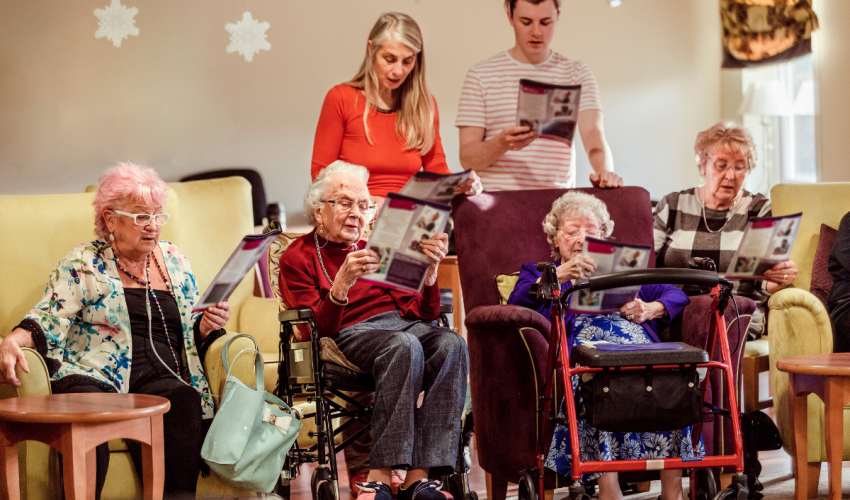Understanding therapeutic and economic benefits of group singing for persons with dementia in senior living facilities — and the staff who support them

Older adults residing in long-term care homes often face challenges such as social isolation and loneliness, but past research suggests we have discovered a powerful solution: singing with others. Research findings have indicated that group singing can foster social connection, elevate quality of life, improve specific health outcomes, and enhance overall well-being. While studies have demonstrated the therapeutic benefits of incorporating choir programs for individuals in long-term care homes, little attention has been given to assessing the potential advantages of such programs for staff members. That’s about to change!
SingWell is currently conducting a pilot study exploring the benefits of a group singing program for both residents living with dementia and care staff members at two senior care facilities in the GTA: Amica on the Avenue and Wellbrook Place. Our choirs are up and running, and the SingWell research team will be visiting the homes over the next few months to assess psychosocial benefits for residents and secondary benefits for care staff — including the potential for group singing programming to improve mental health, reduce stress, and alleviate burnout among staff. SingWell researchers will collect data from residents before and after singing, including self-report surveys, heart rate variability using heart rate arm bands, and cortisol and oxytocin via saliva samples. Care staff will self-report on their sense of burden, distress, and wellbeing on days with and without group singing programming.
The goal of this study is to demonstrate how the positive effects of group singing create a ripple effect for residents and staff. We hypothesize that group singing will foster social connections, reduce stress, and improve overall well-being for residents, while potentially reducing staff absences and increasing staff retention. The data collected during this project could be utilized to inform internal policy briefs, program proposals, and budgetary support for more impactful recreation programming. Furthermore, based on the outcomes of our study, we intend to create a program template and a best practice guide that can be shared with other long-term care and retirement operators looking to implement similar group singing programs.
Overall, the results of this study will broaden the promising base of evidence regarding the benefits of group singing in senior care homes across the country — and continue to build knowledge around group singing as a powerful intervention. This study holds promise not only for improving the lives of residents with dementia but also for enhancing the well-being of the caregiving staff. By fostering a sense of community and joy through group singing, we hope to create a more supportive and connected environment in senior care homes. Stay tuned for updates on our progress and the positive impact this program could have in these communities nationwide.